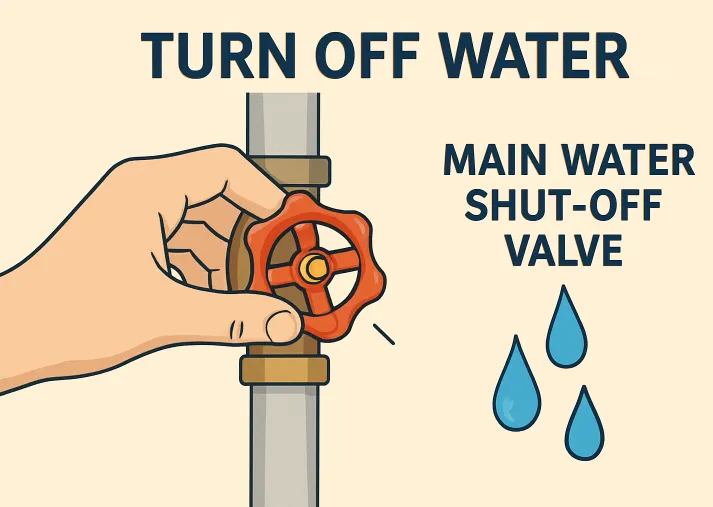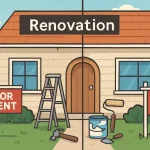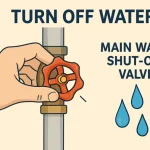Plumbing emergencies often happen without warning and can cause swift damage if not addressed immediately. From ruptured pipes filling your basement with water to a toilet overflowing on a busy morning, your ability to act quickly determines how much your property and valuables are protected. Local assistance, such as emergency plumbing service in Gaithersburg MD can be an immediate resource when you cannot resolve the problem yourself.
Knowing what to do in those first few minutes after discovering a leak or blockage is essential. Most plumbing disasters share warning signs and early symptoms you can recognize and address with simple tools or temporary fixes while waiting for help. With some preparation and a basic understanding of your home’s plumbing system, you can confidently keep damage to a minimum, safeguard your family’s health, and ensure repairs are handled efficiently.
Also Read: Precision Vision: Choosing the Right Tools for Eye Care
Not every plumbing situation is within a homeowner’s capabilities. Sewer backups, persistent low pressure, and water heater failures require technical know-how and can expose homeowners to health or safety risks. Understanding the limits of DIY fixes is crucial to knowing when to call a professional plumber.
Recognizing Common Plumbing Emergencies
Most plumbing crises have telltale signs that let you act before things spiral out of control. Among the most urgent situations are:
- Burst Pipes: Sudden surges in water, new stains on ceilings, or the sound of running water in walls can signal a burst pipe that requires immediate attention.
- Overflowing Toilets: Water rising above the bowl after flushing or failure to drain properly may precede an overflow, causing unsanitary conditions and property damage.
- Clogged Drains: Water backing up in sinks, showers, or tubs is a sign of a blockage that, if ignored, can lead to water damage or even flooding.
- Leaking Water Heaters: Any pooling water around your water heater—especially if it’s hot—can indicate imminent failure or a major leak risk.
Watch for musty odors, unusually high water bills, or persistent damp spots in walls and floors. These could all be subtle indicators of hidden plumbing leaks or failures.
Immediate Steps to Take
Swift action is your best defense when a plumbing emergency strikes. Take these steps to minimize harm and keep your household safe:
- Shut Off the Water Supply: Locate your main water shut-off valve and turn it off quickly to halt water flow. If the fixture’s local shut-off valve is available for isolated incidents, such as a single leaking faucet or toilet, you can use it.
- Turn Off Electrical Appliances: If water threatens electrical outlets or appliances, switch off power using the circuit breaker to prevent electric shock or fire.
- Contain the Leak: Catch drips with buckets, sop up standing water with towels, and use plumber’s tape for small leaks to limit spread until repairs are made.
- Clear the Area: Move valuables, electronics, and furniture away from standing water to prevent secondary damage.
Assembling an Emergency Plumbing Kit
No home should be without a basic emergency plumbing kit, which can buy crucial minutes during an urgent situation.
- Plunger for clearing drains or toilet blockages
- Adjustable wrench to shut valves or loosen fittings
- Plumber’s tape for sealing small leaks
- Sturdy bucket to catch dripping water
- Reliable flashlight or headlamp for poorly lit spaces
- Heavy-duty gloves and safety glasses for personal protection
- Old towels or cloths for absorbing standing water
- Manual drain snake for stubborn clogs
Keep this kit in a location known to all family members, such as a utility closet or under the kitchen sink, to ensure it’s always within easy reach during emergencies.
Preventive Measures to Avoid Future Emergencies
Most plumbing disasters are avoidable with routine care. Key steps to keep your home safe include:
- Inspect and Maintain Your Plumbing: Check visible pipes, joints, and valves for leaks or corrosion. Schedule routine assessments with a licensed plumber to spot trouble early.
- Monitor Water Pressure: Use a gauge to measure and keep water pressure within a safe range (generally 40–60 psi). If your readings are high, consider a pressure regulator.
- Avoid Chemical Drain Cleaners: Over-the-counter cleaners can damage your pipes. For safer long-term solutions, use enzymatic drain cleaners or a manual snake.
- Insulate Exposed Pipes: During colder months, insulate pipes in unheated basements, attics, or crawl spaces to prevent freezing and subsequent bursts.
When to Call a Professional
Knowing your limits saves more than time—it can prevent personal injury and costly errors. Call a professional immediately for:
- Sewage Backups or Strange Toilet Gurgling: These symptoms suggest deep line blockages or breaks that need advanced equipment and expertise.
- Multiple Fixture Failures: If more than one toilet, tub, or sink has issues, the problem is likely with your main sewer rather than a simple clog.
- Persistent Low Water Pressure: Drops in water pressure may result from hidden leaks or issues with your main supply line, which require specialized leak detection tools.
- Water Heater Issues: Leaks, odd noises, or no hot water should only be addressed by a licensed technician due to the risks of scald injury and explosion.
- Gas Leaks: If you smell rotten eggs or sulfur, evacuate immediately and contact your utility company’s emergency line for gas leaks rather than attempting any fixes yourself.
Delaying professional support often leads to compounded damage, higher repair bills, and greater inconvenience. Keep reliable emergency plumber contact information handy and ensure your family knows how to turn off water and electricity in urgent situations.
With knowledge, preparation, and regular care, plumbing emergencies become less daunting. Being proactive minimizes disruption and keeps your home safe, dry, and comfortable—no matter what plumbing surprise comes your way.
Final Thoughts
Plumbing emergencies can feel overwhelming, but preparation and quick thinking can make all the difference. Understanding your plumbing system, keeping the right tools on hand, and knowing when to call a professional ensure small problems don’t turn into major disasters. By combining proactive maintenance with a calm, informed response, you protect your property, minimize damage, and maintain peace of mind—even when the unexpected happens.







